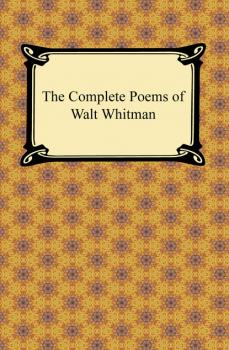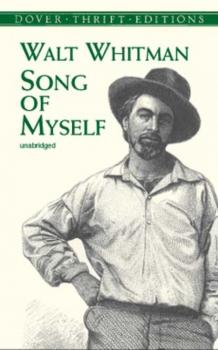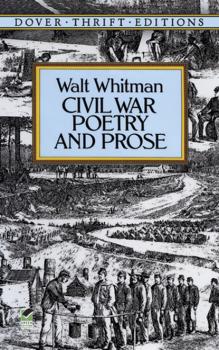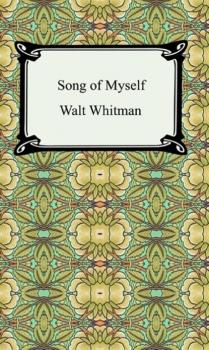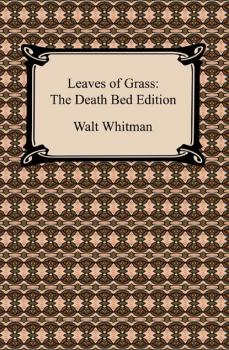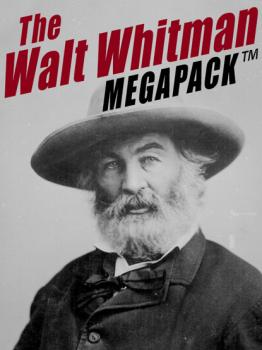Walt Whitman
Список книг автора Walt WhitmanThe Complete Poems of Walt Whitman
With the first publication of «Leaves of Grass» in 1855, Walt Whitman was solidified as an American poet of undeniable importance. The poems contained in that slim volume candidly spoke of politics, slavery, sexuality, consciousness, and the spiritual world. His content was as radical as his form; he utilized free verse unlike anyone before, creating a poetic tongue that was unique and personal yet universal and cosmic. Born in New York in 1819, Whitman came to represent the spirit of an American poet. Influenced heavily by early 19th century Transcendentalism, Whitman befriended Ralph Waldo Emerson who would help shape his literary voice and vision. This volume contains the complete poetic works of Walt Whitman. Through his poems 'Song of Myself', 'Sleepers', 'To A Stranger', 'The Sleepers', and 'I Sing the Body Electric' we see a poet of great range and endless influence, one who is a «poet of democracy». Whitman's legacy is strong, influencing the beat movement, and countless poets of today. His verse is as layered and textured as the American soil he wrote on, becoming an essential part of America's cultural heritage. This edition of his complete poems is sure to satisfy the curious reader as well as the scholar. Whitman's poems are as vital and resonant today as ever, proving to be timeless and permanent fixtures of literary history.
Song of Myself
“Song of Myself”, a portion of Walt Whitman’s monumental poetry collection “Leaves of Grass”, is perhaps one of his most loved poems. Whitman is considered by many to be one of the most important and influential American poets of all time and it is the beautiful and moving “Song of Myself” that helped cement his reputation. Exhilarating, fresh, epic, and modern, the poem is at its essence an optimistic and inspirational look at the world. It is also a brilliant and fascinating study in diction and wordplay. First composed in 1855, the poem seeks to capture the unique language and meanings of words of that time, while also embracing the rapidly changing world of mid-nineteenth century America. “Song of Myself” is the essential distillation of Whitman’s poetic vision, which sought to make poetry more appealing and readable by employing a free verse style and a simple form. While it was hailed as a modern masterpiece by many critics soon after its first publication, it was also far ahead of its time and was considered scandalous and obscene for its frank depiction of human sexuality and desire. Revised over the years along with Whitman’s other works, “Song of Myself” is presented here in its final form as it appeared in the “Death-Bed” edition of “Leaves of Grass”.
Leaves of Grass: The Death-Bed Edition (with an Introduction by John Burroughs)
In response to Ralph Waldo Emerson’s call for the United States to have its own unique poetic voice, Walt Whitman rose to the challenge to create what would ultimately be his most profound work. Taking its title from the colloquial term “grass”, meaning a work of minor value, Whitman’s “Leaves of Grass” is anything but that. Over his lifetime Whitman would continue to expand and revise his most famous work up until his death in 1892. The first edition contained just twelve poems, significantly smaller compared to the final “deathbed” edition, reproduced here, which included over 400. “Leaves of Grass” is unique for its celebration of the sensual pleasures of life in a time when such an attitude was considered immoral. A departure from a poetic tradition which relied on symbolism, allegory, and meditation on the religious and spiritual, “Leaves of Grass” instead focused on nature and the individual’s role in it. Initial reception of the work was quite controversial, but over time this collection of poetry has come to be acknowledged as one of the truly great American works of literature. This edition includes an introduction by John Burroughs.
Leaves of Grass: The Original 1855 Edition
In response to Ralph Waldo Emerson’s call for the United States to have its own unique poetic voice, Walt Whitman rose to the challenge to create what would ultimately be his most profound work. Taking its title from the colloquial term “grass”, meaning a work of minor value, Whitman’s “Leaves of Grass” is anything but that. Over his lifetime Whitman would continue to expand and revise his most famous work up until his death in 1892. The first edition, which is reproduced here, contained just twelve poems compared to the final “deathbed” edition which included over 400. “Leaves of Grass” is unique for its celebration of the sensual pleasures of life in a time when such an attitude was considered immoral. A departure from a poetic tradition which relied on symbolism, allegory, and meditation on the religious and spiritual, “Leaves of Grass” instead focused on nature and the individual’s role in it. Initial reception of the work was quite controversial, but over time this collection of poetry has come to be acknowledged as one of the truly great American works of literature.
Song of Myself
Considered by many to be the quintessential American poet, Walt Whitman (1819-92) exerted a profound influence on all the American poets who came after him. And it was with this inspired, oceanic medley, «Song of Myself» (which in the first editions of Leaves of Grass was still nameless), that this great poet first made himself known to the world.Readers familiar with the later, more widely published versions of Leaves of Grass will find this first version of «Song of Myself» new, surprising, and often superior to the later versions — and exhilarating in the freshness of its vision. In this inexpensive edition, this enormously influential work will especially delight students, teachers, and any devotee of Walt Whitman.
Civil War Poetry and Prose
Walt Whitman experienced the agonies of the Civil War firsthand, working, in his forties, as a dedicated volunteer throughout the conflict in Washington's overcrowded, understaffed military hospitals. This superb selection of his poems, letters, and prose from the war years, filled with the sights and sounds of war and its ugly aftermath, express a vast and powerful range of emotions.Among the poems include here, first published in Drum-Taps (1865) and Sequel to Drum-Taps (1866), are a number of Whitman's most famous works: «O Captain! My Captain!» «The Wound-Dresser,» «When Lilacs Last in the Dooryard Bloom'd,» and «Come Up from the Fields, Father.» The letters and prose selections, including Whitman's musings on the publication of his works, on the wounded men he tended, and his impressions of Lincoln traveling about the city of Washington, offer keen insights into an extraordinary era in American history.
Song of Myself
One of Walt Whitman's most loved and greatest poems, «Song of Myself» is an optimistic and inspirational look at the world. Originally published as part of «Leaves of Grass» in 1855, «Song of Myself» is as accessible and important today as when it was first written. Read «Song of Myself» and enjoy a true poetic masterpiece.
Leaves of Grass: The Death Bed Edition
In response to Ralph Waldo Emerson's call for the United States to have its own unique poet, Walt Whitman rose to the challenge to create what would ultimately be his most profound work. Taking its title from the colloquial term «grass», meaning a work of minor value, Whitman's «Leaves of Grass» is anything but that. Over his lifetime Whitman would continue to expand and revise his most famous book up until his death in 1892. Here in this volume we have reproduced the last edition, commonly referred to as «The Death Bed Edition».
The Walt Whitman MEGAPACK ®
The Walt Whitman MEGAPACK™ collects more than 500 classic poems, essays, and letters of Walt Whitman, including «Leaves of Grass,» Whitman's magnum opus.
Leaves of Grass
In 1855, Walt Whitman published — at his own expense — the first edition of Leaves of Grass, a visionary volume of twelve poems. Showing the influence of a uniquely American form of mysticism known as Transcendentalism, which eschewed the general society and culture of the time, the writing is distinguished by an explosively innovative free verse style and previously unmentionable subject matter. Exalting nature, celebrating the human body, and praising the senses and sexual love, the monumental work was condemned as «immoral.» Whitman continued evolving Leaves of Grass despite the controversy, growing his influential work decades after its first appearance by adding new poems with each new printing.This edition presents the original twelve poems from Whitman's premier 1855 publication of Leaves of Grass. Included are some of the greatest poems of modern times: «Song of Myself,» «I Sing the Body Electric,» and «There Was a Child Went Forth,» works that continue to upset conventional notions of beauty and originality even today.
